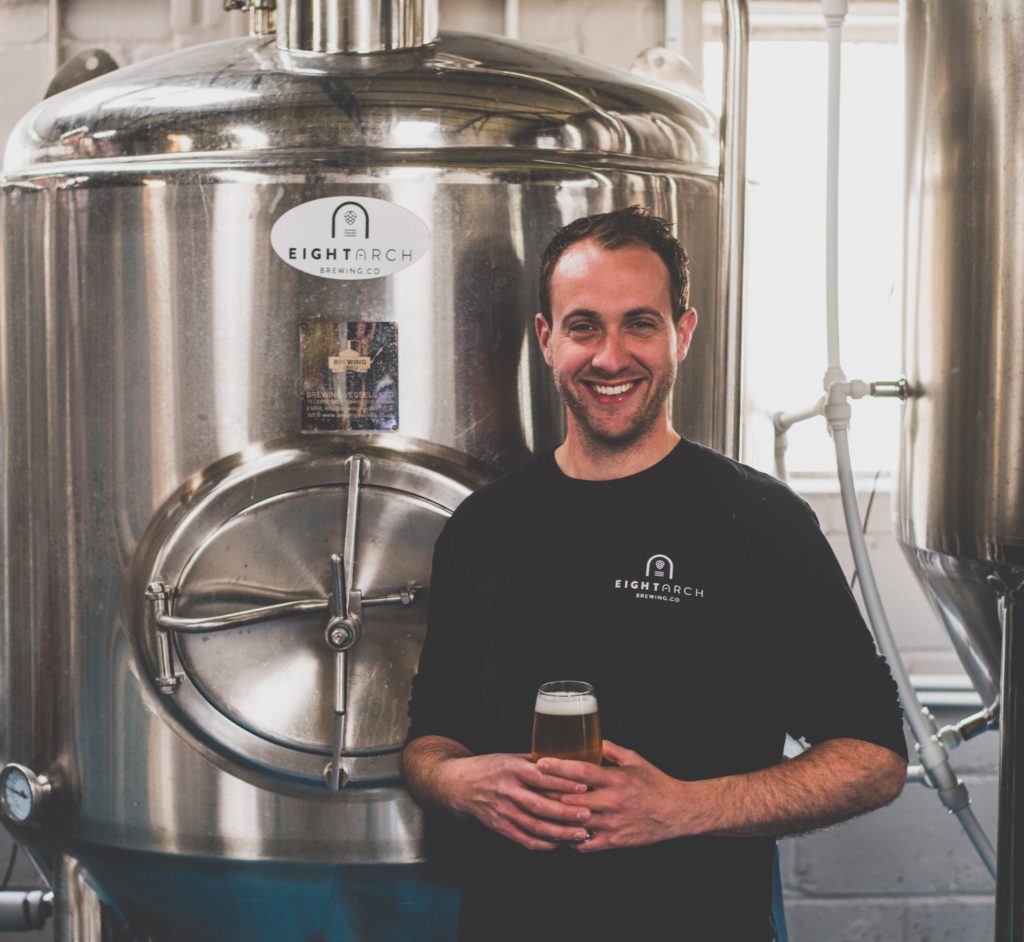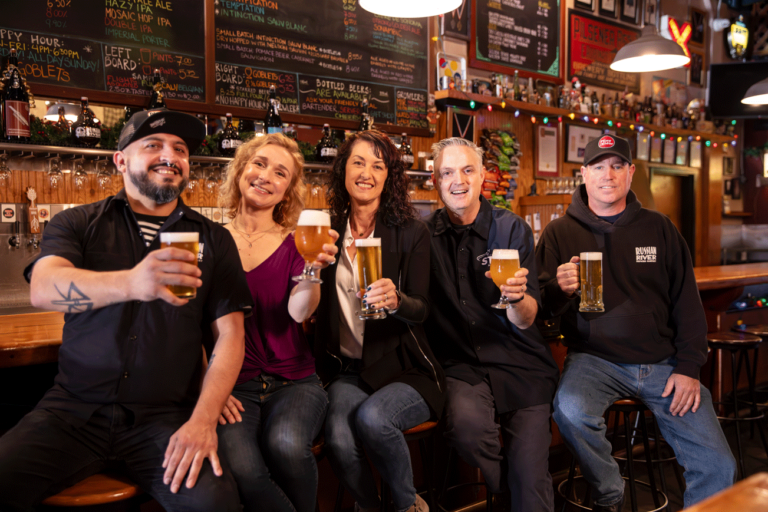Selling out of beer two hours into the first night your taproom opened was always going to bode well. Four years on, with a raft of awards under their belt, Dorset’s Eight Arch Brewing Co are going from strength-to-strength. And according to founder Steve Farrell, it’s all about making approachable beers that people enjoy, and never forgetting the importance of the local community.
“It all started with the Kernel.”
How many times have you heard a brewer utter those words? A fair amount of people reading this probably know a brewer that has been inspired by the work of Evin O’Riordan and his London brewery.
The ability to make consistently great beers, regardless of style, that give the consumer an unwavering level of confidence in their purchase is something many brewers both strive for and dream about.
Steve Farrell, owner and founder of Eight Arch Brewing Co, is one such brewer.
“Their beers opened up a new world for me, they were a genuine ‘Wow’ moment,” he recalls.
Farrell would hunt down the hoppy, balanced beers Kernel are renowned for and in doing so, knew his idea of what beer could be, would change as a result. He didn’t stop there, though.
“When I knew I wanted to take this enjoyment of beer forward, I reached out to breweries I admired in the hope I could just come and help, doing whatever they wanted of me.”
Evin and the Kernel were among the first to oblige. Welcoming Farrell for a brewday that involved the lauded Imperial Brown, no less. Ed Mason at Five Points and Gyle 59 brewery also opened their doors, giving the aspiring brewer invaluable experience in the world of professional brewing.
“I was still learning all of the time. They didn’t know me, but they had faith in me and to offer me that experience is something I’ll never forget,” he remembers.
Farrell’s brewing journey started several several years earlier, you guessed it, in his garage. He didn’t have an epiphany that drove him to brew, rather a desire to experiment and try his hand at a new hobby and make some affordable beer in the process.
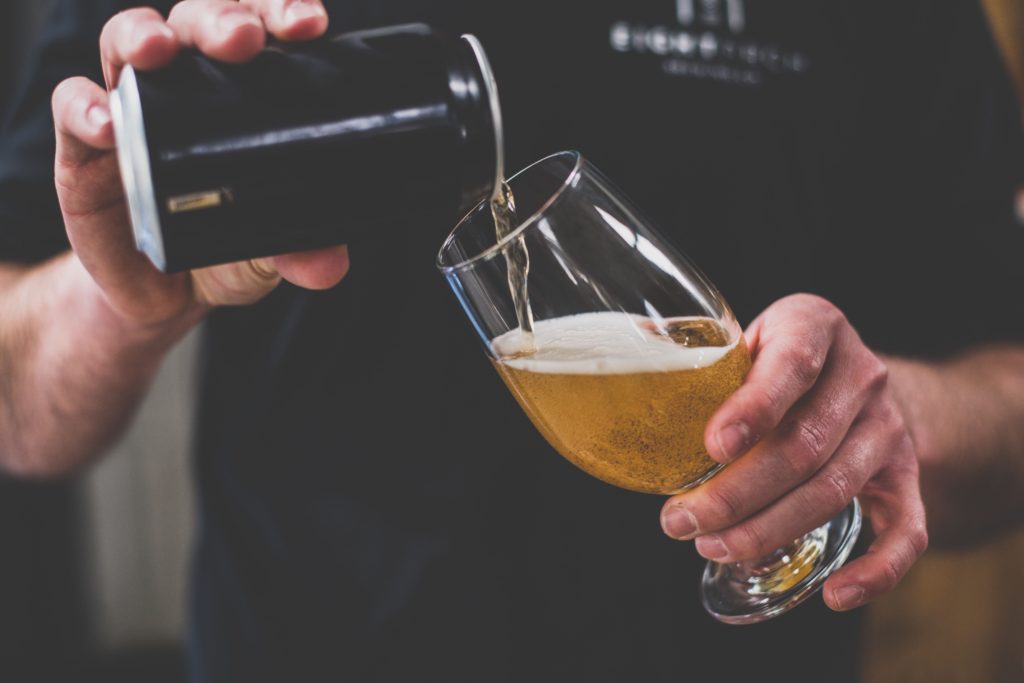
A foray with malt extracts was soon dismissed in favour of a more accomplished setup with a modest HLT, Mashtun, Kettle and the rest. Couple that with the classics of the printed page from experts such as Cicerone founder Ray Daniels and off Farrell went.
“I found myself studying online, reading as many books as I could, and brewing as frequently as possible. People say I was bitten by the bug but I didn’t feel that way. But maybe I was,” he laughs.
Although Farrell was developing a passion for brewing, he was expected to follow a career in the family firm of a transport distribution business based in Poole.
“My dad was to retire and I was expected to take over. But during the time working there, we ended up losing around 95% of our business when the biggest client we delivered for was taken over,” says Farrell. “With that, the whole distribution side was moved elsewhere so we needed to assess our options.”
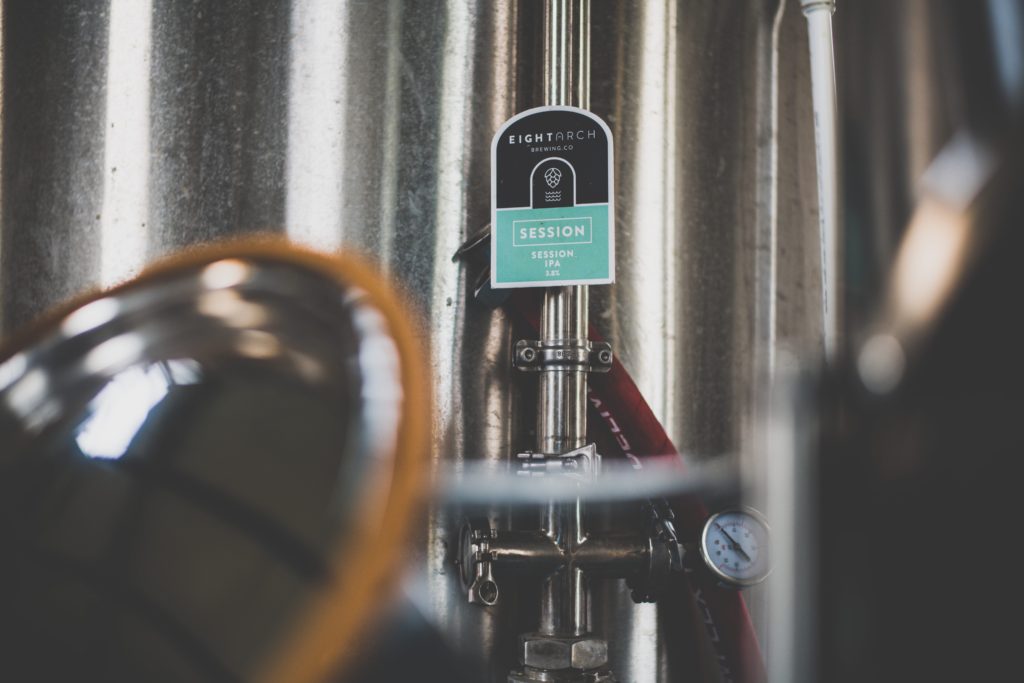
The pickings were slim, to say the least.
“We had 12 trucks and obviously tried to find more work but it wasn’t to be. It was a challenging period but I had to speak to my Dad and both realise it wasn’t worth it,” he explains. “We paid off everything we owed, sold the trucks and that was that.”
Farrell had job offers from others transport firms but at that point, he only had eyes for his own brewing operation, and nothing was going to stop him.
It would also just happen that Farrell’s wife Ellie worked with a colleague. Her husband Richard Ward had worked for Courage for many years. They agreed to meet and discuss Farrell’s idea.
“We had a good chat, do the maths and go away to do our own research. It was agreed that if we couldn’t settle on things, Richard would tell me it wasn’t meant to be and I’d leave it at that,” says Farrell.
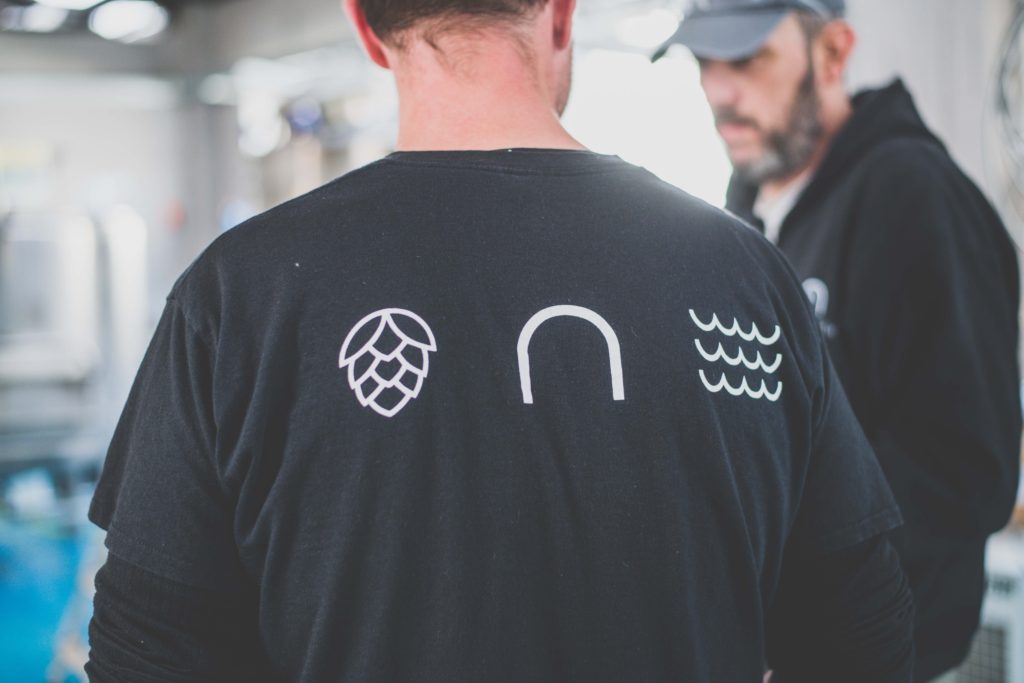
Thankfully they saw eye to eye and he had the faith to press ahead with making a go of things professionally. A sleuth of courses at Brewlab in Sunderland followed and with it, Farrell’s desire to open Wimborne, Dorset’s first brewery in 80 years, grew.
And before long, a 1200sqft unit, not far from the eight arches at nearby landmark Julian’s Bridge, was secured and Eight Arch Brewing Co was born. Kit arrived in January of 2015 and the first brew took place on the last day of that month.
Prototypes One, Two and Three were brewed, with the former going on to become its popular Parabolic Pale Ale. Starting out as cask only, Farrell swiftly investigated the idea of offering on-site consumption. A license was secured and by March, the first taproom opening.
Farrell readied three pins of beer and hoped for the best. Opening at 4pm, all of the beer had jubilantly imbibed by 6pm.
“It immediately became evident that I’d have to tell everyone. When I made the announcement, it was greeted with a massive ‘Waheyyyyyyy!!!’. I appreciated their understanding!,” he recalls.
Like many breweries, much changed in the years that followed that memorable first night. Increased demand for the brewery’s beers led to the acquisition of an additional adjacent unit next to the initial, retained, site.
Capacity has increased, currently comprising five 1000l FVs and a single 2000l vessel. Cask is still king, though keg now accounts for around a quarter of what the brewery produces and in-house canning has proved a real boon for getting its beers further afield.
Ward was skeptical of the canning line while Farrell was uncertain small pack sales would greatly increase as a result of the spent. But the numbers don’t lie. The brewery sold 12,000 bottled beers during 2017 but output close to 50,000 330ml cans of its beers last year.
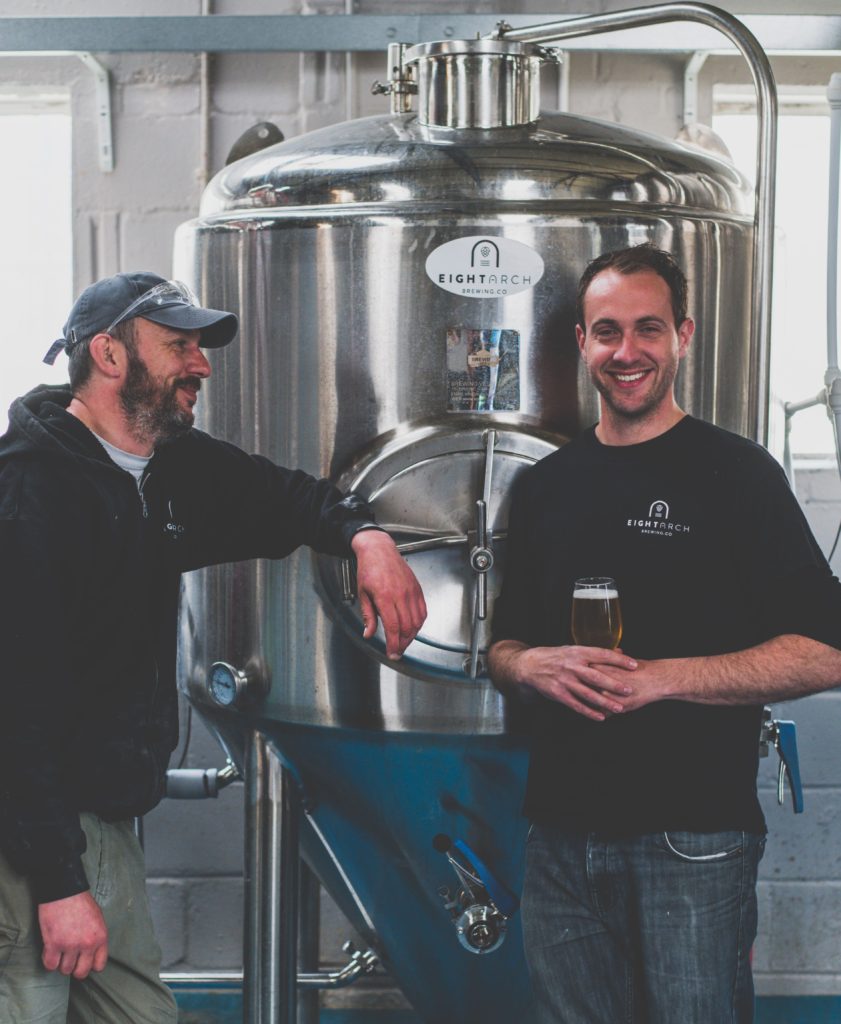
The business has also added another full time employee in the form of brewer Mark Wainwright who joined from Brewhouse and Kitchen, while Mike Lawrence, co-founder of nearby bottleshop The Crafty Cow helps out with sales and deliveries. The team is completed with taproom team Ryan and Sarah.
What has remained the same, however, is the important role the taproom plays in the business. Around 500 pints are sold in the four hours over the bar at the new and improved taproom.
“If you can offer the taproom experience you simple have to. It’s such a huge asset for the brewery and it has become a hub for the local community, too,” says Farrell. “You benefit from the increased GP that comes from selling directly, but the positives run deeper than that.”
He adds: “Being able to engage with people, see them enjoy your beer and know the community uses it as meeting point is incredibly rewarding.”
A taproom in the newer facility nearly didn’t happen, though.
Though the unit was literally seconds from the existing building that housed the brewery and taproom, its proposal was met with an objection from the local licensing committee.
“We’re not too far from a local skatepark and we were met with the objection that such a taproom could put the skaters at risk of the underage selling of alcohol. You would think that was an acceptable objection in theory, until we let them know the skatepark had it’s own alcohol license!” Farrell laughs.
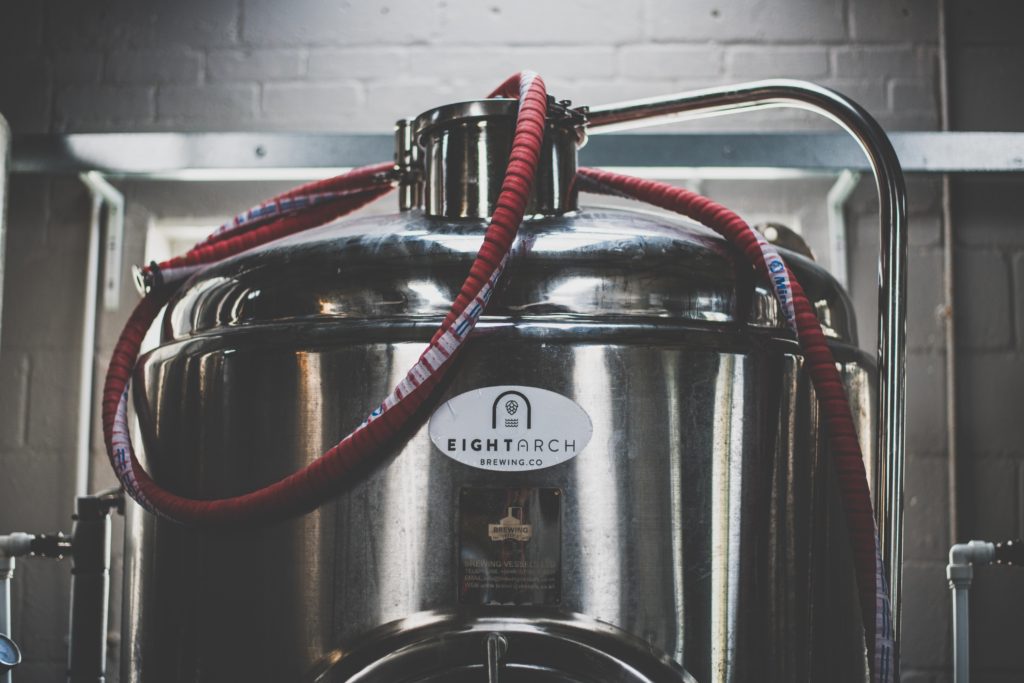
Beers sold here range from hoppy pales to IPAs and Stouts. Popular beers that play a frequent role in its portfolio are Corbe;, Session, Bobolink Coffee Oat Stout, Easy Life Pale Ale, Square Logic Pale Ale and Little Dragon Kolsch Style Ale.
“Our beers sit well within the modern, hazy styles and those that appear to the so-called more traditional drinkers,” says Farrell. “We never go too far in one extreme direction but they sell because they hit the level that people want from a good, well-rounded beer.”
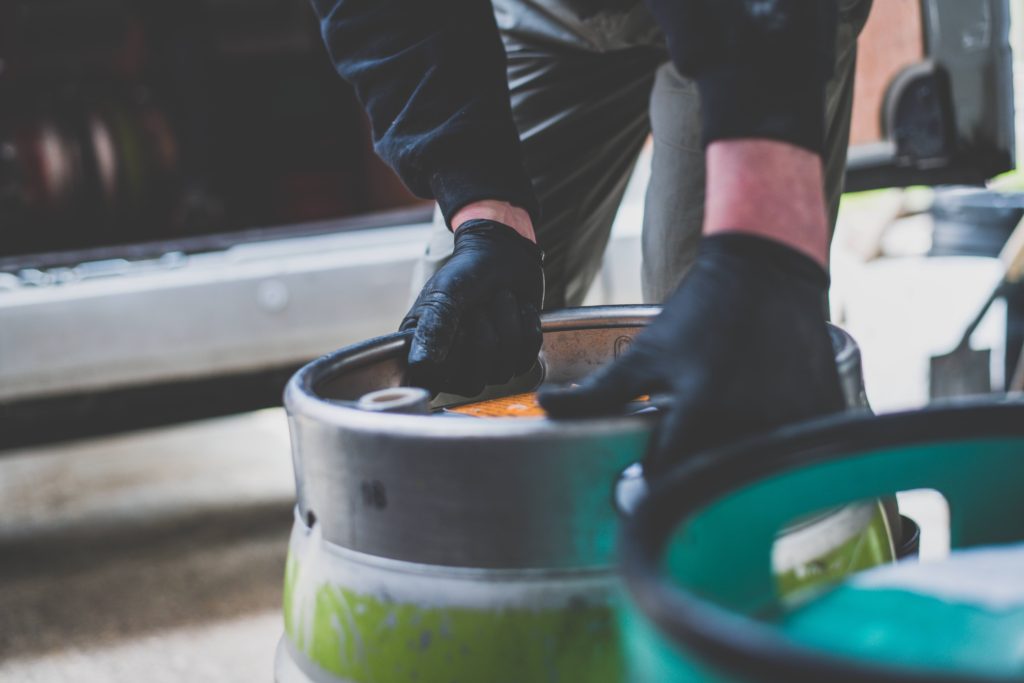
The increased capacity of the aforementioned taproom has only gone to enable Eight Arch Brewing Co to cement its place in the Wimborne ecosystem, and Farrell knows how important local business has been for his brewery.
“The local community has been amazing. Without them we wouldn’t be where we are,” he says. “That support has allowed us to grow and we are very fortunate.”
But the beers have impressed further afield, too. The brewery picked up no less than a fitting eight awards at a recent SIBA South West Regional Awards.
Elsewhere, Beers are delivered by the brewery to nearby accounts in Portsmouth, Dorset, Southampton and, while wholesalers helped distribute the beer elsewhere in the UK and also to countries like Italy.
“I’m a firm believer in the importance of the local. I’ve seen it first hand as it’s happened to me and this brewery. Local should come first and you can build upon that, if you want to,” he explains.
Farrell adds:” Of course, brewery life isn’t without its challenges. We can’t make enough beer at the moment. But we wouldn’t want to be sitting on lots of beer, either. It’s a good place to be.
“To know people enjoy your beer is the best feeling. But we’re always striving to do better and in doing so, hope people continue on that journey with you.”
Photos: Darren Lovell

